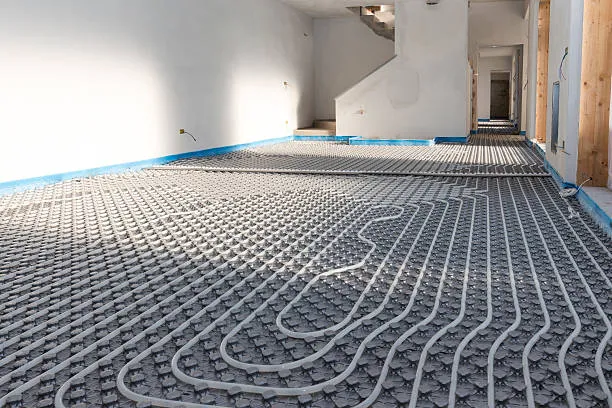The systems that many of us rely on for heating our homes are extremely dependable, but like all mechanical equipment, they need attention from time to time. You wouldn’t set off on a long road trip without checking your car’s engine oil and the air pressure in all four tires. It’s a good idea to put the same maintenance instinct into practice before you put your home’s heating system to work for the cold season.
A certified professional should inspect your HVAC system at least once a year. Routine inspections will enable you to spot emerging problems before they develop into full-blown emergencies, and regular cleaning of key components will keep systems running efficiently and maintain indoor air quality.
Conducting regular home heating system maintenance can protect your furnace and system. Don’t skimp on basic maintenance or else you could be in for a big bill to fix the system.
With a little bit of care and knowledge, you can check your heating system and keep it running smoothly. You don’t need to be a professional to take care of the little things.
Replacing an HVAC system could cost $10,000 or more. Performing regular inspections and some simple maintenance will help you avoid that hit to your bank balance.
To help you avoid having to schedule major repair work or a full replacement, we’ve put together 7 important tips for home heating system maintenance. Read on to see what you should be doing to keep your system working.
1. Check Your Thermostat
Checking your thermostat is a good way to see if things are working as they should. It’s one of the easiest ways to do your own heating system maintenance.
Twice a year, in the spring and in the fall, turn the thermostat up. You should hear the furnace kick in.
Leave the furnace to run for a while. If it continues to run your system is working.
If the furnace switches off in less than a few minutes you may have a problem. This problem is likely something called short cycling. You should call a professional to take a look.
The other thing to do when checking your thermostat is to make sure it’s in the right setting. Make sure it’s on cool or heat mode. A correctly set thermostat is also more efficient and will save you money.
2. Check and Replace Heating Filters
Check your filters regularly. This is a simple and effective heating system maintenance task.
You should check air filters once a month. Replace them every three months.
If you have an oil-fired furnace or boiler, make sure you replace the oil filter once a year.
Replacing filters improves the quality of the air in your home. It also makes your heating system more efficient. Finally, there’s a good chance a clean air filter will help avoid some more serious issues with your heating system.
You can get a gas ducted heating service from Surrey Air.
3. Tune-Up the Heat Pump
This isn’t an aspect of heating system maintenance you should take on yourself. It is, however, an important thing to get done regularly. Schedule a heat pump tune-up twice a year.
Your tune-ups should occur before it gets too cold and before it gets too hot. You want to make sure you catch any issues before the heat pump has to start working harder.
Keeping your heat pump in good working order will make sure you avoid excessive wear and tear on it. As a result, you’ll have an efficient heat pump. You’ll also avoid the heating system developing bigger issues.
4. Keep Your Heating System’s Outside Unit Clean
When you’re doing home heating system maintenance, don’t forget the outside unit.
In the fall, keep an eye on leaves that might be blocking the unit’s fan. Remove leaves and other debris from around the fan to make sure it works properly. In the winter, remove accumulated snow from the outdoor unit.
5. Keep Internal Vents Clean
Inside your home, check the vents in each room. The vents can get blocked with pet hair or other dust and dirt.
If your internal vents are blocked, your furnace won’t run as it should. The air won’t circulate well in your home.
If the air isn’t flowing correctly, you will put extra stress on the furnace. This stress will affect its performance. It will also reduce its efficiency and lifespan.
Get hydronic heating service from Surrey Air.
6. Don’t Overwork The Heating System
An effective way to keep a heating system working well is to reduce the amount of heating and cooling it has to do. Check your home for leaky windows and doors. You want to make sure that cold or hot air isn’t entering the house as much as possible.
The more outside air getting in the more the furnace will have to run. This will put undue pressure on the heating system. Your system will have a shorter lifespan and will develop more serious problems as a result.
Inspect your home. Check the window edges and door frames. You can hold a candle near the window frames to see if any air is getting in.
Seal the door frames and window edges with a simple foam strip and you’ll protect your heating system. You’ll also save yourself a lot of money in the long run.
You might also want to consider hiring an HVAC professional to conduct an energy audit in your home. This will tell you if there are any other areas that might need to be addressed to reduce the impact on your furnace.
7. Get a Professional for Heating System Maintenance
No matter how much heating system maintenance you perform yourself, it’s also worth scheduling regular checkups with an HVAC professional. If you want to have a professional check your heating system, schedule them at least once a year.
A professional checkup once a year will find any potential problems before they become big problems. A little preventative maintenance like this could save you from expensive repairs to your heating system down the road.
You can get Heating Repair Service from Surrey Air.
8. Have water temperature and pressure checked.
Once the system has been running for an hour or so, have the temperature and pressure gauge checked. The water temperature should be within the range of 180⁰F and 200⁰F. Pressure within the system should be between 12 PSI and 25 PSI—for a two-story house, 18 PSI is all that’s needed. If the temperature or pressure measurement falls outside these specified ranges, consult a technician.
9. Have the circulating pump lubricated
If it has lubrication cups, a few drops of 3-in-1 oil will be squirted into them.
10. Clean soot from the inside of the boiler’s combustion chamber
This periodic checkup is part of your technician’s regular maintenance and is similar to cleaning the chamber in a forced-air system, including cleaning with a wire brush and vacuuming.
11. Dust radiator surfaces and straighten fins on baseboard heaters
All that’s needed is a vacuum. If fins are badly bent, a professional may use a fin comb to straighten them.
12. Get air purged from the radiators
The bleeder valve on each baseboard run or radiator will be opened. The valve will be left open until water begins to trickle out, then it will be closed.
13. Drain and flush the system
Most experts recommend having a professional do this once every five years at the minimum.
Do a Little Heating System Maintenance to Keep Your System Working
You don’t need to be a hardcore DIY-er to take on home heating system maintenance. A little manual labor and attention will help your heating system function as it should throughout the year.
Check your filters, outside unit, and internal vents. These simple steps are easy to do and will save you money. You can also get Braemar heating service from Surrey Air.
Keep an eye on your HVAC thermostat. It’s sort of like an early-warning system. And schedule regular checkups from a professional.

